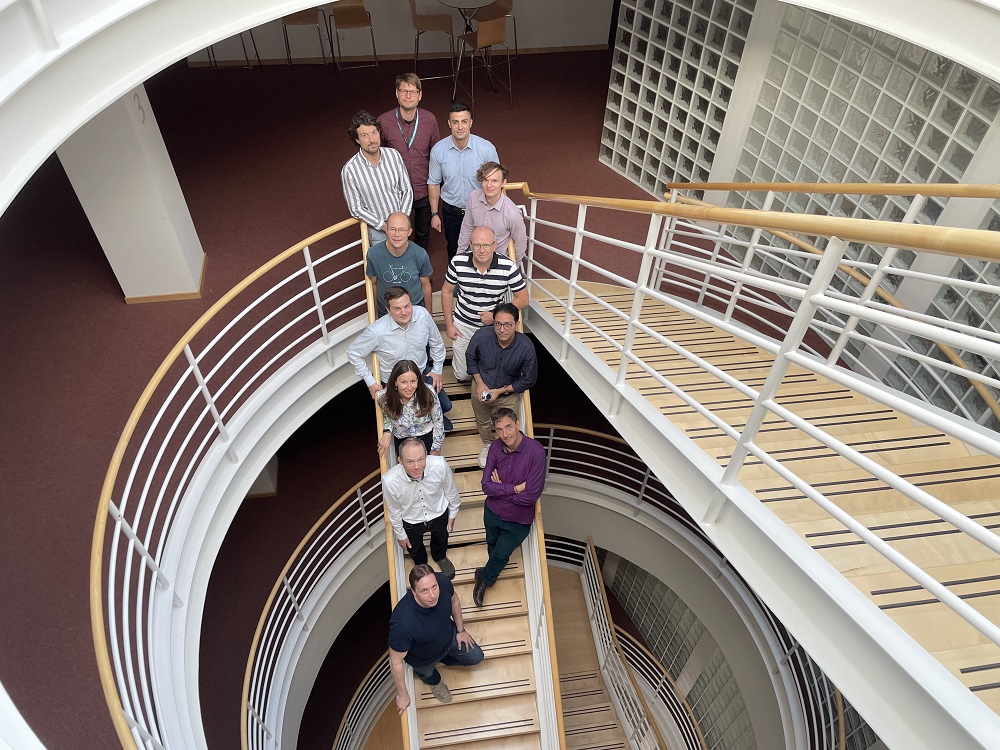Jena, Germany | November 21, 2023
Compact Quantum Chip for Secure High-Speed Communications
Project CBQD wants to enable fast and reliable random number generation with new photonic quantum chip
The German Federal Ministry of Education and Research (BMBF) is funding the project CBQD with 5.24 million euros to develop a chip-based quantum random device and conduct research on new methods for quantum-safe high-speed communications. The project is expected to develop a compact quantum chip that can generate random numbers at high speeds on the basis of quantum photonic effects. The chip will be developed according to the Common Criteria, the international standard for testing and evaluating IT product security and is set to become the basis for numerous IT security applications. At the Fraunhofer Institute for Applied Optics and Precision Engineering IOF the chip is meant to be integrated and tested within existing systems of quantum key distribution.
To protect sensitive data from cyberattacks, cryptographic processes use so called random numbers to generate keys. These random numbers prevent hackers from being able to guess the correct numbers for a key by simply recognizing number patterns. In cryptography, the quality of these random numbers has a direct influence on the security of the system, because it determines the difficulty of breaching the system.
Science has already made great progress in the development of new technologies in the past years, generating and distributing such true, unpredictable random numbers and consequently guaranteeing a high-security encryption. It necessitates a source of true randomness that is fast enough and can be used from any device. And this is where the quanta come into play.
Quantum random number generators promise highest possible security
Quantum random number generators (QRNG) use quantum mechanical phenomena such as the decay of atoms or photon phase noise from laser sources to generate unpredictable and random data, promising the highest possible security. Because they are based on the quantum mechanical principles of indeterminacy and so called “superposition”, these quantum generators provide secure random number generation for future communications systems.
The project CBQD (“chip-based quantum random device”) is set to develop a compact, photonic QRNG chip. It will work with a speed of up to 5 gigabit per second to enable quantum-safe high-speed communications. At the same time, the chip will be developed according to the Common Criteria for IT product security set by the German Federal Office for Information Security (BSI). The project realizing QRNG chips uses modern silicon-germanium technologies to develop so called electrophotonic integrated circuits (EPIC) to create a fully integrated solution with laser source, waveguide structures, photodiodes and analog as well as digital signal processing.onally high spatial resolution make it possible to identify subcellular structures of the two model organisms and subsequently assign them to known organelles," says Dr. Falk Hillmann, researcher for the Evolution of Microbial Interactions at the Leibniz Hans Knöll Institute in Jena, impressed. His team selected the biological model samples and developed a suitable preparation method on EUV-transparent silicon nitrite membranes.
Integration into high-dimensional quantum sources at Fraunhofer IOF
At Fraunhofer IOF this QRNG chip will be integrated into already existing systems of quantum key distribution (QKD). In concrete terms that means the integration into a gigahertz clock speed, high-dimensional source, which enables especially high key rates. With these systems the institute’s researchers ensure a secure transport for the generated keys to potential senders and receivers. The newly developed QRNG is proven to generate secure keys, which in turn can be used for verifiably secure transport through the quantum key distribution.
Apart from the practical application of secure distribution of encrypted data, another application lies in the photonic quantum chip with the secure postprocessing of already transported keys. Here, randomness is also necessary to increase security.
The very high random number generation rates in combination with the miniaturized and compact form and scalability of QRNG chips additionally open up many fields of application. Possible scenarios range from future systems of quantum key distribution via for example satellites or optical fibers, to classic cryptography, and to high-security machine to machine communications.
About the CBQD project
The CBQD project is coordinated by the Fraunhofer Institute for Photonic Microsystems IPMS. Aside from the Fraunhofer Institute for Applied Optics and Precision Engineering IOF, there are three more partners and one associated partner collaborating on the project. They are the Leibniz University of Hannover (LUH), the Leibniz-Institute for Innovative Microelectronics (IHP), the Technical University Darmstadt (TUDa), and the company Adva Network Security GmbH (associated partner).
The project started with a kickoff in October 2023 with a runtime of three years. The BMBF is funding the project with 5.24 million euros.
